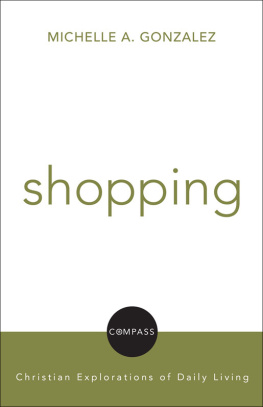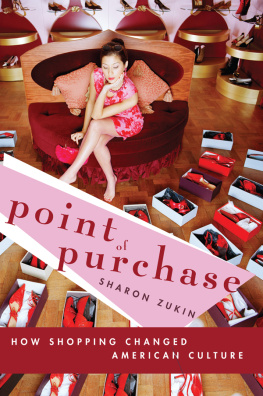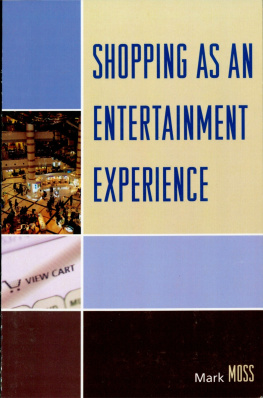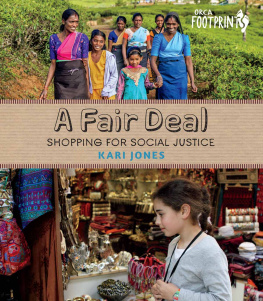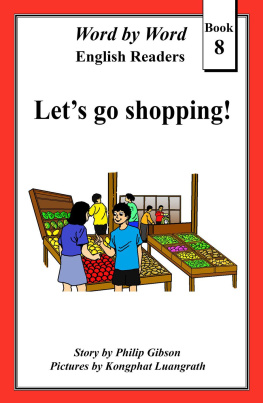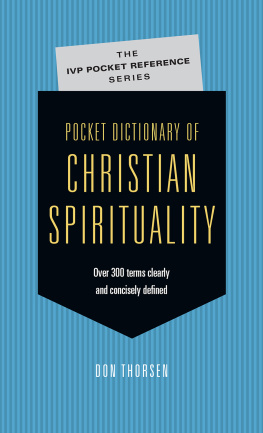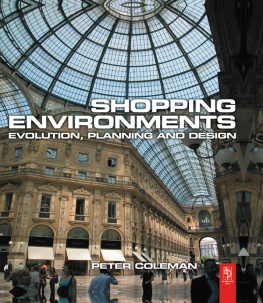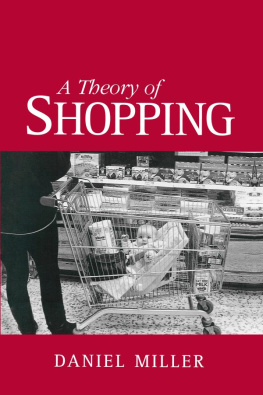
shopping
Michelle Gonzalezs Shopping fashions a delightful tapestry illuminating the borderlands between temptation and tradition, wants and needs. Her incarnational theology refuses an easy Puritanical anti-materialism and suggests a practical reverence for life that can help readers keep shoppingfor all its quotidian joysin its proper place.
Jon Pahl
Professor of History of Christianity
in North America, Gettysburg Seminary
Author of Shopping Malls and Other Sacred Spaces:
Putting God in Place
compass
Christian Explorations of Daily Living
David H. Jensen, Series Editor
Playing
James H. Evans Jr.
Shopping
Michelle A. Gonzalez
Forthcoming Volumes
Working
Darby Kathleen Ray
Eating and Drinking
Elizabeth Groppe
Parenting
David H. Jensen
shopping
Michelle A. Gonzalez
Fortress Press
Minneapolis
SHOPPING
Compass series
Christian Explorations of Daily Living
Copyright 2010 Fortress Press, an imprint of Augsburg Fortress. All rights reserved. Except for brief quotations in critical articles or reviews, no part of this book may be reproduced in any manner without prior written permission from the publisher. Visit http://www.augsburgfortress.org/copyrights/contact.asp or write to Permissions, Augsburg Fortress, Box 1209, Minneapolis, MN 55440.
Scripture quotations are from the New Revised Standard Version Bible, copyright 1989 by the Division of Christian Education of the National Council of the Churches of Christ in the USA. Used by permission. All rights reserved.
Cover design: Laurie Ingram
Book design: Christy J. P. Barker
eISBN: 9781451414790
Library of Congress Cataloging-in-Publication Data
Gonzalez, Michelle A.
Shopping : Michelle A. Gonzalez.
p. cm. (Compass)
Includes bibliographical references.
ISBN 978-0-8006-9727-3 (pbk. : alk. paper) 1. Consumption (Economics)Religious aspects--Christianity. 2. Consumption (Economics)Moral and ethical aspectsUnited States. I. Title.
BR115.C67G66 2010
241'.68dc22
2010010688
contents
Shopping is integral to everyday life. In order to obtain the basic necessities of life, such as food, clothing, and shelter, most of us shop. Shopping, at this basic level, is especially pertinent in a globalized economy. It connects the shopper to people who harvest crops, stitch clothing, and build houses. Shopping is also connected to other practices that have been central to Christian faith from its earliest days, practices such as gift-giving and hospitality. Many of us shop and buy things so that we might give to others. In twenty-first-century American life, however, shopping displays an added function as an end in itself or as an end that secures other ends, such as economic growth, patriotism, or sheer entertainment. Over the past several years, several political leaders have told us to shop for the common good of our nation. Advertising often suggests that shopping offers pleasures uniquely its own. Shopaholics will attest that for them the process of shopping itself is more important than the goods acquired (or given away) through shopping. For many in our day, we shop not in order to live but live in order to shop.
What does Christian faith say about shopping? Quite a bit, according to Michelle Gonzalez in this engaging and accessible study. By attending closely to Scripture, Catholic social teachings, and the actual experience of shopping in our hyper-connected world, Gonzalez offers a vision of shopping that avoids the extremes of American consumerism (shop until you drop; live to shop) and Christian antimaterialism (all shopping is sinful and the goods acquired through shopping are corrupt). In the process, she turns our attention to the beauty of human handiwork as well as the ugliness of exploitation caused by inhuman forms of shopping. The result is a much-needed reformulation of shopping that more nearly reflects the justice, beauty, and wholeness central to Christian faith.
David H. Jensen
Outside my office I have a bulletin board full of cartoons. All of themexcept oneare from Boondocks, the sharp Aaron McGruder comic strip that looks at political, racial, and social justice issues. The one exception is a Bizarro cartoon that shows a priest sitting in a confessional. From behind the screen an unidentified penitent communicates via cartoon bubble, I sell shoes for Prada.
This cartoon resonates with me for many reasons, but the most important for our purposes is the shame and guilt this poor soul feels for his job at a high-end Italian designer retail shop. While I would not sit behind the confessional screen and say, I work at Prada, I would whisper, I wish I could buy Prada. Why the guilt? The other cartoons may clue you in. I consider myself a Roman Catholic deeply informed by a commitment to social justice, solidarity with the poor, and attentiveness to issues of identity that the Boondocks cartoons, while not religious, represent. And yet I would love to own some Prada, knowing very well that for the cost of one Prada bag a family of ten in my husbands Guatemalan hometown of San Lucas Tolimn could be fed for a year. I feel guilty about wanting the Prada. I know it is wrong, yet I still want it. A Catholic confessional is a perfect venue for such a crisis of faith and values.
This book emerges from that struggle. In this short volume I explore the everyday practice of shopping and its implications for Christians globally. My context and intended audience are American Christians who wrestle with an understanding of their religion and faith life that is critical of the consumerism, capitalism, and gluttonous consumption that characterize dominant American culture. Yet we have to shop, and some of you may confess along with me that we like to shop. We often confuse things that we want with things that we need. In our particular society, we are constantly encouraged to buy. In fact, I suspect only in the United States is shopping seen as a way of fighting terrorism (the mantra post-September 11) and a means of helping our country get out of debt. Whether it is billboards, television, or magazines, we are surrounded by the lure of the car, the dress, and the flat-screen television. Apples iPhone, perhaps one of the most brilliant products from one of the best promoters of consumerism, not only keeps you wanting to buy a new one with each new version but also has you busy buying applications for the iPhone you already own. It is a product of consumption that seemingly requires more consumerism.
I consider myself a Catholic informed by Jesus often quoted pronouncement, No one can serve two masters; for a slave will either hate the one and love the other, or be devoted to the one and despise the other. You cannot serve God and wealth (the global economic sphere, an extremely wealthy individual. I constantly struggle with that fine line between want and need, comfort and excess. I am well aware that some of the items I purchase are created or cultivated by workers who do not receive just pay. I am equally aware that even those low-paying jobs are sometimes the only source of income they have.
This book explores the tensions and struggles I have outlined above. Essentially, the book attempts to answer the following questions: Can you be a committed Christian who likes to shop? Is shopping sinful? Can our love of goods impede our relationship with the sacred? As you may have surmised from my earlier comments, this is not going to be an anti-materialist book that condemns all shopping as sinful. However, I also will not fall on the other extreme, condoning the materialism that has come to dominate our country in ways that make people easily value objects over people. Somewhere in the middle, in the tensions of our everyday lives, we will find a clearer sense of how we do and how we should shop.
Next page
